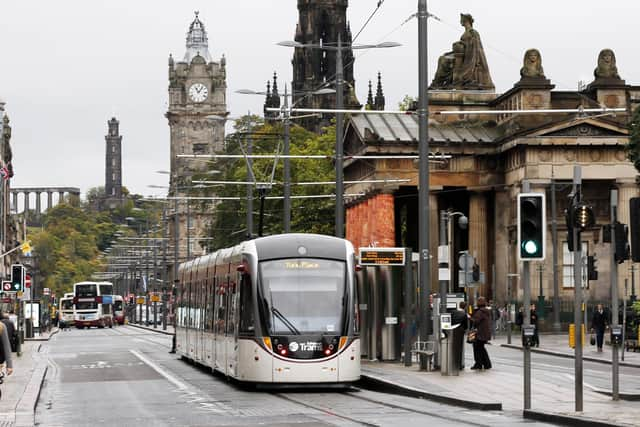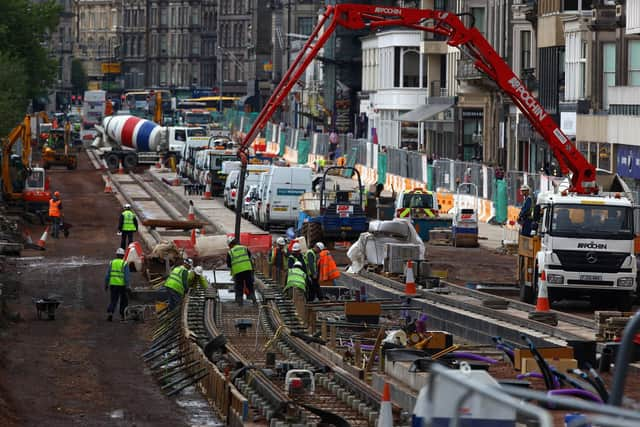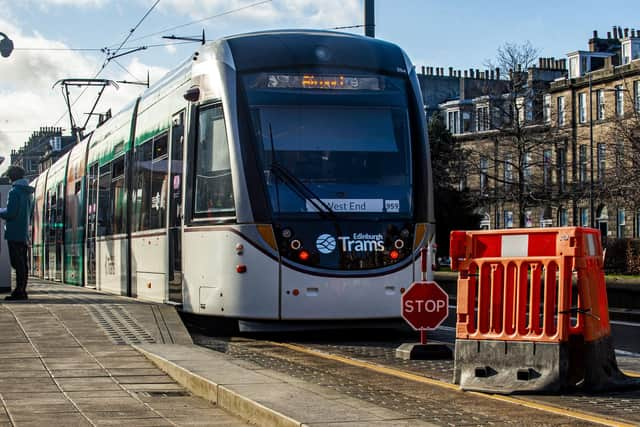Edinburgh tram inquiry report: Lord Hardie questions John Swinney’s integrity as Scottish minister discredits report findings
Lord Hardie’s long-awaited inquiry report into the Edinburgh tram line fiasco triggered a political row after it questioned former finance secretary John Swinney’s integrity and ministers criticised some of its findings.
The scathing 959-page document blamed City of Edinburgh Council tram firm Tie along with the local authority and the Scottish Government for the shambolic project and recommended a new law to enable the criminal prosecution of those “who knowingly submit reports that include false statements to councillors”.
Advertisement
Hide AdAdvertisement
Hide AdLord Hardie’s inquiry also said the “best estimate” of the total cost of the tram scheme was £835.7 million – nearly £50m more than the council said. The line opened in 2014, three years late, hundreds of millions of pounds over budget and a fraction of its original length.
Lord Hardie said the three bodies’ “acts or omissions were principally responsible for the failure to deliver the project on time, within budget and to the extent projected”.
He singled out Tie for particular criticism in his four-volume report on Tuesday, stating: “There can be little doubt that Tie’s mismanagement played a significant role in the failure.”
The inquiry chair severely criticised several key figures involved, including Mr Swinney and a Transport Scotland official over a phone call about mediation in a dispute between Tie and its contractors. The report stated: “As with all witnesses who gave evidence in person, they testified on oath and their lack of candour calls into question their integrity.”
But Mr Swinney told The Scotsman: “On one specific question relating to the mediation process, my candour and integrity is called into question by the chair.


"This is simply not supported by the evidence before him. I told the inquiry I was informed of the progress of the mediation – but neither I, nor my officials, had a decision-making role or a veto. I have been entirely candid with the inquiry.”
Meantime, transport secretary Mairi McAllan said: “The inquiry took too long, was too costly and in some instances the evidence heard does not support the conclusion drawn.”
She added: “Evidence was led during the inquiry that made very clear that it is good governance … for there to be one project lead, and in this case, it was the council.”
Advertisement
Hide AdAdvertisement
Hide AdLord Hardie said ministers should have continued to be involved in the project after they withdrew Transport Scotland officials in 2007.


A Scottish Government spokesperson said: “When the overall context of the decision around Transport Scotland’s involvement in the project is considered, the criticism in Lord Hardie’s report is not justified."
The report comes more than nine years after Lord Hardie was appointed to conduct a “swift and thorough” investigation by the-then first minister Alex Salmond.
However, the former judge said the inquiry’s cost to the end of July had been reduced from £13.1m to £8.7m “by using existing public resources that were not replaced and discounting the public expenditure already incurred relating to these resources”.


The 8.5-mile line between Edinburgh Airport and York Place at the east end of the city centre opened three years late in 2014 at a cost of nearly £777m, £231m over budget, with a northern loop between Roseburn, Newhaven and the city centre shelved.
Lord Hardie said there had been a “litany of avoidable failures on the parts of several parties”. He concluded: “Poor management and abdication of responsibility on a large scale have had a significant and lasting impact on the lives and livelihoods of Edinburgh residents, and the reputation of the city.”
He criticised Mr Swinney’s decision for Transport Scotland officials to “scale back” their involvement in the project, which he said “was a material change of such significance that officials gave serious consideration to their seeking a ministerial direction to obey this instruction”.
The Labour-Liberal Democrat Scottish Government had provided £500m funding for the scheme, but the SNP said it would not provide “a penny more” after failing to get the scheme scrapped when coming to power in 2007.
Advertisement
Hide AdAdvertisement
Hide AdLord Hardie said: “Ministerial directions are formal instructions from ministers telling their officials to proceed with a spending proposal in a particular manner, despite an objection from the permanent secretary or other senior official in the department. They are extremely rare and have been described as the ‘nuclear option’.


"It appears that Mr Swinney may have realised the fundamental error and unreasonableness of the ministerial decision to scale back officials’ involvement in the project when problems arose with it after the Infraco [infrastructure] contract was signed.
"He became directly involved in it. During the course of the Princes Street dispute, he told [David] Mackay, the chairman of Tie, ‘to get it sorted’. His explanation that he meant Tie to follow the dispute resolution procedure does not bear scrutiny."
Lord Hardie observed in the report: “From seeking to distance themselves from major decisions on the project, they [ministers] were now directing the council as to what should be done.”
He said: "Following the emergence of the difficulties with the project, it can be seen that Scottish ministers, represented by Mr Swinney, not only recognised their mistake in withdrawing the oversight of Transport Scotland officials designed to protect the public purse, but became more involved in issuing directions to the local authority and Tie about actions to be taken by them.
“Such intervention would not have been necessary had Scottish ministers allowed officials to undertake their normal role in major transport projects that were in receipt of substantial grant funding. Their role was intended to protect public funds represented by the grant funding, but such protection was removed as a result of the actions of Scottish ministers.”
Lord Hardie also concluded the cost of the scheme “was an understatement because the council allocated costs to other budgets that truly related to the project and failed to include the net present value of borrowing £231m to complete the restricted line”. He said there had also been a “substantial claim” by a landowner, with the council unaware at the time of its cost.
Lord Hardie said the budget overrun was caused by a series of factors including Tie’s “failure to work collaboratively” with the council and others, its failure to report accurately on progress, the council’s failure to monitor that, design delays and deficient governance.
Advertisement
Hide AdAdvertisement
Hide AdCouncil leader Cammy Day said: “From a first reading of the report, it’s clear that serious mistakes were made and that this had a significant impact on the city.
"There’s no getting away from the fact that the original project caused a great deal of disruption to residents and businesses, as well as damaging the city’s reputation, and, on behalf of the council, I want to apologise for this.
“I won’t, however, apologise for building a tram system, or for our ambition to develop it further. After all, creating a better connected, environmentally friendly transport system is essential for a modern, successful city and we need to transform the way people move around if we are to achieve our net zero goals.
“We’ve now launched passenger services on the completed line to Newhaven, the success of which was down to the hard work of the council-led project team, but also thanks to lessons learned from the first project.”
Scottish Conservatives Lothians MSP Miles Briggs said: “Lord Hardie’s report is a scathing critique of the SNP Government and City of Edinburgh Council’s roles in a national scandal.
“Lord Hardie is highly critical of councillors and the arms-length bodies responsible for the project – but he also singles out the Scottish Government for criticism.
“He is clear that ministers failed to protect the public purse and acted in the SNP’s political interests, rather than the public interest. John Swinney, especially, has questions to answer for removing safeguards that would have protected grant funds.”
Comments
Want to join the conversation? Please or to comment on this article.